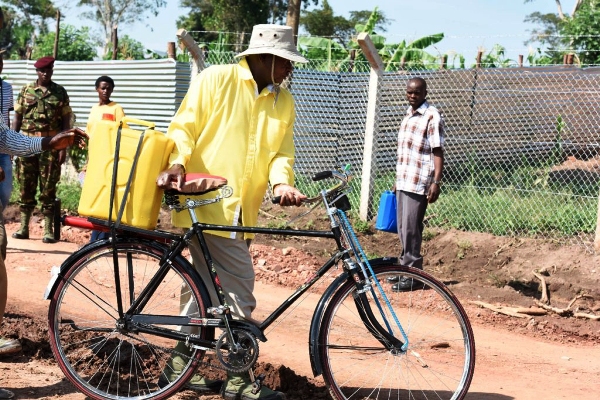Columnists
Uganda’s micro mindset
Why do most Ugandans, at least those that should set the agenda, think and act small?
Uganda is a very inconsistent society. We have some of the biggest families in the world. Most Ugandan men are polygamous. When Ugandans make/steal some money they build big homes and drive big cars.
Ugandan men love women with big body features, and wed them in big parties. When it comes to food, Ugandans cook and eat big. In Uganda, men with big tummies are often construed as wealthy.
However, when it comes to thinking, particularly development, Ugandans-more disturbingly those that should set the agenda-think small. We build small roads, yet we love to drive big cars. We build small power dams, yet we are dreaming of industrialising Uganda which will require more electricity.
Mr. President, I am often left in amusement when I see you on TV launching very small projects: small buildings, small water sources, small markets, small processing plants, small hotels (actually motels), bottle irrigation, and sorts of other small things. Your honourable office and name is littered around the country on very small things.
Why have we failed to recapitalise UDB?
When government took a decision to recapitalize Uganda Development Bank, they promised a mere Ushs. 500 billion (US$ 138 million). “Mere” because commercial banks, that the authorities must match to influence cheaper and long-term lending, hold a capital asset base of over Ushs. 4 trillion (U$ 1.2 billion).
What is even more depressing is that the government has failed to give UDB the Ushs. 500 billion as promised. One year they get some Ushs. 30 billion, another year they get 20 billion. it all depends on the mood of the ‘giver’.
In the meantime, government spends Ushs. 420 billion (US$ 115 million) on travel, and another Ushs. 140 billion (US$ 38 million) on workshops. It further spends Ushs. 115 billion (US$ 32 million) on vehicle purchase.
In total, the government is spending Ushs.1.4 trillion (US$ 385 million) on things that could be avoided, or at least scaled down, without affecting the functioning of the State. Imagine the amount of impact we would cause if just half of such money was saved and injected into UDB to drive Uganda’s development.
At personal level, over 90% of Ugandans own very small businesses (SMEs) dealing in a common business. These SMEs are run as sole proprietorships, yet they could do better if they were turned into partnerships.
I have heard some people celebrating our small thinking (SMEs owned individually) as a sign of high level of entrepreneurship among Ugandans. In my view this could be one of the root causes of Uganda’s economic tragedy.
Individualism is killing Uganda. Even couples cannot do business together. You find them engaging in similar businesses separately – husband and wife owning separate kiosks selling similar commodities. It is in Uganda where each of four brothers owns a boda boda!
I construe this as small thinking. Big thinkers (constrained by capital) would pool their small resources and form partnerships to enjoy economies of scale, earn more revenue and profits, and reduce competition between and among themselves.
What do big thinkers do?
Big thinkers would turn popular wedding fundraisings into venture capital, instead of squandering the billions on arranging marriages that are bound to fail.
Big thinkers would be more interested in how they could partner to bid for the government parastatals that ended up in the hands of foreigners, on the pretext that Ugandans did not have enough money to compete.
Big thinkers and their government would have followed up on Uganda’s military expeditions in the region with concrete business/investment deals. Instead we took our kiosk-minds to South Sudan and Somalia.
In 2013, authorities in South Sudan expelled Ugandans doing petty jobs in their country. At the time, over 2,600 Ugandan youth were riding boda-boda (commercial motorcycle) in Juba and other towns in South Sudan.
I often risk challenging the proponents of entrepreneurship. Nearly everyone is speaking highly of the role entrepreneurship can play in fighting unemployment in developing countries such as Uganda.
Afraid of making decisions!
Every young Ugandan has been told that the only way to succeed is to start a “small business” of their own. To buttress this dogma, inspirational phrases have been crafted: “To make it big you need to think small.”
Why has this line of argument become popular? Because the country has failed to create decent jobs for the young people. So entrepreneurship has become a plausible excuse.
I once read a commentary entitled, “Want to make a difference in the world? Think small.” And since thinking small is a self-fulfilling prophecy, Uganda has remained a small open economy, with small businesses only able to access small credit (microfinance) to produce non-tradable products for low income groups, thereby forcing everyone (bankers, insurers, service providers, etc.) to target small markets.
Small thinking has molded us to think of and treat the world differently. The world has responded in the same way, offering small time opportunities.
In his 1987 book, The Art of the Deal, Donald Trump-yes that man who called us something-something the other day-writes, “Most people think small because most people are afraid of success, afraid of making decisions, afraid of winning.”
Reasons we think small
I think Uganda is a perfect place to vindicate Trump. Mr. President, could this be the actual reason you love Trump so much?
But what else could be making us unable to think big? Why do we have a micro mindset? To put it more plainly, why do most Ugandans, at least those that should set the agenda, think small?
The reasons must be numerous; I thought about a few: First, I think our subsistence background has a lot to explain about our inability to think big. Since pre-colonial times Uganda has remained predominantly agrarian and largely subsistence.
We grow up in a natural rural setting, surviving on gifts of nature. As a result, we grow up in relatively easy lives, freer and less affected by the vicissitudes of the capitalist economy. Subsistence peasants worry not about food prices, interest rates, inflation, or generally bills of any kind.
As we all know, comfort kills ambition. In his book, “The Persistence of Subsistence Agriculture: Life Beneath the Level of the Marketplace,” Tony Waters agrees with this thesis.
Self-centred short-termism
Historically, Uganda has been led by persons with subsistence background. From the very first head of state, Milton Obote and his colleagues (save for Kabaka Edward Mutesa II who was a ceremonial President) to the current crop of leaders, this country has had leaders whose early lives might have constrained their ability to dream and act big, beyond the power they held.
As a result, most of Uganda’s policies have either targeted small outcomes or been implemented by people with a micro mindset that gets contented easily with small accomplishments.
Second, political uncertainty, insecurity and conflict could also have contributed to our kiosk mindset. Research shows that political worries can affect decisions. Business leaders, investors and the general public delay decisions to invest or buy when the future is unclear.
From mid-1960s to early ’90s, Ugandans lived constant lives of political uncertainty. When the NRA/NRM took charge of the country and restored stability and hope, many Ugandans started to think long term and dreaming big. Economic recovery ensued until mid-2000s when uncertainty resurfaced. It is farfetched to say that self-centred short-termism has reemerged.
Donor dependency syndrome
Third, the colonial legacy also left us with the micro DNA. Although causal significance of colonial legacies is difficult to establish, researchers have established “path determinations” that link today’s levels of economic development in Africa to the past colonial distortions.
For example, the British had a policy that was intended to stifle Africans, while encouraging Europeans and Asians to dominate the most lucrative sectors of the economy (manufacturing, commerce and large scale agri-business). We were socialized to think we can only cultivate a few crops, sell them to Europeans who possess the brains to transform them into finished products.
There are multitudes of books about this thesis. I have read a few: Why Nations fail (Daron Acemoglu and James Robinson), The White Man’s Burden (Bill Easterly), How Europe Underdeveloped Africa (Walter Rodney)
In particular, William Easterly, a former senior researcher at the World Bank and one of my favourite economists, decries the ‘donor dependency syndrome’ that has retarded homegrown initiatives capable of transforming Africa.
Too careful to take risks
Mr. President, to get Uganda to another level, you leaders, particularly you, must create and communicate a bold direction that inspires results. You must communicate big, demand big results from your colleagues, and make everybody accountable.
Many Ugandans, including your colleagues in government, no longer take you seriously. Why? Because you do not follow your speeches with action. You have demystified threats. “That must stop,” you warn. It doesn’t and nothing happens.
“We must put money in UDC to build industries and recapitalize UDB to provide long term capital,” you direct in a State of the Nation Address. The following day the PS/ST of Ministry of Finance calls a press conference and announces, “There is no money for that.”
Mr. President, who is in charge of this country? Priorities are being given lip service with the money going to waste in uncoordinated and unmonitored government projects. Uganda badly needs state-led development with private sector being actively facilitated to complement structural change.
Mr. President, the reason this country, with all the potential visible everywhere, is not transforming, is because you the leaders became too careful to take risks. You are afraid of thinking big, thinking disruptive, and putting a stop to what has failed to work. We shall not go far if we fail to rid ourselves of things and people that do not deliver results.
Comments






















